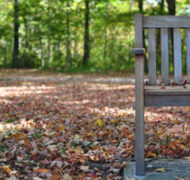How to Live in This Economy
Blog / Produced by The High Calling
On a Monday during piano lessons, I just sit with the dead at the cemetery.
Is there such a thing as a sustainable economy of the soul in this industrial world addicted to speed?
Only a wind from the west moves through the granite stones. Leaves fall soundlessly, right to the ground and burned right out.
In front of the ivories, the children will play loud for Mrs. Livermore, up and down the scale and then the hand right there in mid-air—a wait—a rest.
Mrs. Livermore will count.
Then exhale.
Rest time is not lost time; rest time is what gives meaning to the rest of time. I roll down my window. Inhale autumn air, scent of summer dried and memory laden.
From the driver’s side window, I can see the piano teacher’s husband raking leaves off the graves of the dead.
He gathers up the dead and fallen off the dead and buried, and one by one, he leaves Mrs. Schneider and then Mr. Kercher, then Mr. Schefter, waiting for the down of white winter.
He fills his arms with all the brittle and dry, heaps it into his rusting wheelbarrow. He does it again and again, gathering up the refuse, gathering up the withered and worn like a man gathering strength in what’s left behind.
He pushes his wheelbarrow of leaves up the yellow line of the dead end street. Upends the wheelbarrow and leaves avalanche out into his fall-tilled garden. The last of his tomatoes sit in a basket at the garage door.
He rakes the used up from the sky right across the plowed earth. The dead leaves from the place of the dead now laying down a layer of composting life. There never are endings, only new beginnings, everything plowed into the possibility of a fertile beginning .
In less than a week, both a senior principal in a corporation and a manager in an organization tell me in separate conversations that there used to be seasons to their toil. A time to reap and a time to rest.
But this economic storm is a hurricane bearing down on the natural ebb and flow of work cycles, and now it all just keeps blasting, just keeps coming, just keeps pounding them down. The manager turns to me and says he wishes he was a farmer, wishes he could find space of fallow.
He asks me, “What is it like to rest?”
I don’t know if I should tell him: if we refuse Sabbaths of idleness, we construct our own idols.
If we refuse rest and think of our work more important to Him than our rest in Him, we make our calling into the golden calf.
If we don’t take breaks, we break.
He knows it: in the digital era we have lost all sense of seasons. All sense of day and night and on and off and fertility and furlough and idol and God. We wind the world, our bodies, tight and let go and expect to be in motion forever, spun, us watchmakers of our own.
Driven by forces higher up, we’re driven from the Highest of all, and how do I tell him? Somehow there has to be seasons, there are always seasons if there is any revolution. Farmers know this: it’s only the field that has had a rest that can yield above the rest.
The piano teacher’s husband folds the leaves into soil, into the fallow that waits, and I stay here, still and witnessing the only sustainable economy . . .
The one that gathers new strength through a season of furlough, he trusts the life that comes from the burnt out laying down in the long, still rest of a furrow.
Article and photos by Ann Voskamp, author of One Thousand Gifts: A Dare to Live Fully Right Where You Are.





